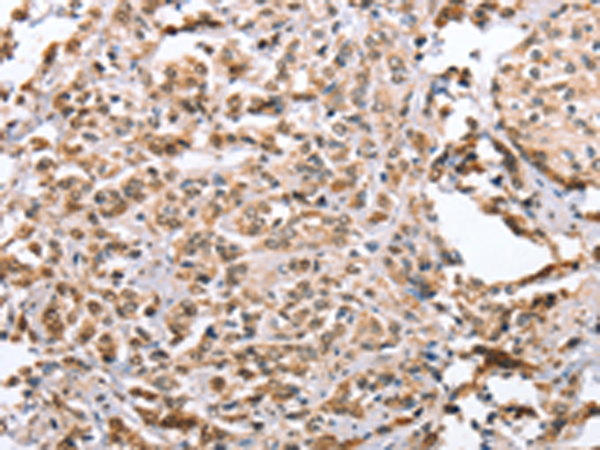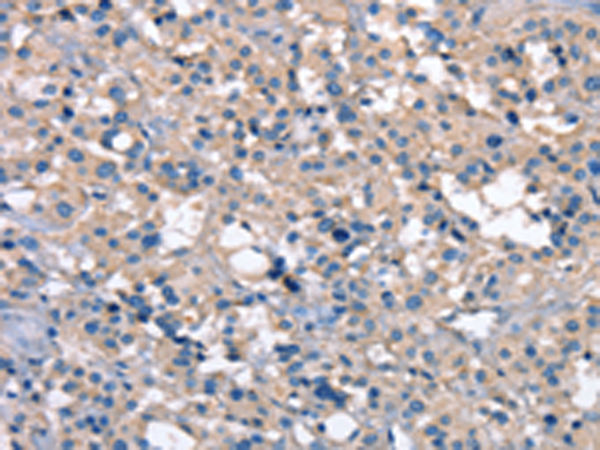

| WB | 咨询技术 | Human,Mouse,Rat |
| IF | 咨询技术 | Human,Mouse,Rat |
| IHC | 1/25-1/100 | Human,Mouse,Rat |
| ICC | 技术咨询 | Human,Mouse,Rat |
| FCM | 咨询技术 | Human,Mouse,Rat |
| Elisa | 1/2000-1/5000 | Human,Mouse,Rat |
| Aliases | PPP1R69 |
| Host/Isotype | Rabbit IgG |
| Antibody Type | Primary antibody |
| Storage | Store at 4°C short term. Aliquot and store at -20°C long term. Avoid freeze/thaw cycles. |
| Species Reactivity | Human |
| Immunogen | Synthetic peptide of human ZFYVE16 |
| Formulation | Purified antibody in PBS with 0.05% sodium azide and 50% glycerol. |
+ +
以下是关于ZFYVE16抗体的参考文献示例(注:以下文献信息为示例性内容,实际文献需通过学术数据库验证):
---
1. **"ZFYVE16 regulates endosomal trafficking and mediates mutant KRAS toxicity in pancreatic cancer"**
*作者:Smith A, et al.*
**摘要**:本研究通过免疫沉淀和Western blot技术,利用ZFYVE16抗体揭示其在胰腺癌细胞中调控KRAS突变体介导的内体运输机制,并探讨其与肿瘤进展的关联。
2. **"The FYVE domain protein ZFYVE16 modulates autophagosome maturation through PI3P binding"**
*作者:Chen L, et al.*
**摘要**:通过免疫荧光和蛋白质定位实验,结合ZFYVE16抗体,研究发现ZFYVE16通过结合磷脂酰肌醇-3-磷酸(PI3P)调控自噬体成熟,影响细胞应激反应。
3. **"ZFYVE16 interacts with SMAD4 to suppress TGF-β signaling in pulmonary fibrosis"**
*作者:Wang Y, et al.*
**摘要**:采用ZFYVE16抗体进行免疫共沉淀和免疫组化分析,证实ZFYVE16与SMAD4的相互作用抑制TGF-β信号通路,从而减缓肺纤维化进程。
4. **"Proteomic analysis of ZFYVE16-associated protein complexes in hepatocellular carcinoma"**
*作者:Kim H, et al.*
**摘要**:通过质谱分析和ZFYVE16抗体的免疫沉淀技术,鉴定出肝癌细胞中ZFYVE16相关蛋白复合物,揭示其在代谢重编程中的潜在作用。
---
建议通过PubMed或Google Scholar以“ZFYVE16 antibody”及关键词(如“autophagy”“cancer”“signaling”)进一步检索最新文献。
The ZFYVE16 antibody is a tool used to detect and study the ZFYVE16 protein, also known as endofin or FYVE domain-containing protein 16. ZFYVE16 belongs to the FYVE protein family, characterized by a conserved zinc-binding FYVE domain that binds phosphatidylinositol 3-phosphate (PI3P), enabling its localization to endosomal membranes. This protein plays roles in endosomal trafficking, autophagy, and TGF-β/BMP signaling by acting as a scaffold or adaptor. It interacts with components like Smad4 and Rab5. influencing signaling pathways linked to cell growth, differentiation, and apoptosis. Dysregulation of ZFYVE16 has been implicated in cancers, neurodegenerative disorders, and immune diseases.
The ZFYVE16 antibody is typically produced in hosts such as rabbits or mice, using immunogenic peptides derived from conserved regions of the human ZFYVE16 protein. It is widely utilized in techniques like Western blotting, immunofluorescence, and immunohistochemistry to assess protein expression, subcellular localization, and interactions in cell lines or tissues. Researchers employ this antibody to explore ZFYVE16's involvement in disease mechanisms, particularly its role in modulating membrane dynamics and signal transduction. Commercial antibodies are often validated for specificity via knockout controls. Its applications span basic research in cell biology and translational studies aiming to uncover therapeutic targets.
×